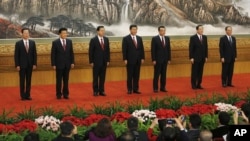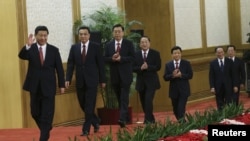BEIJING —
After months of speculation and a messy political scandal, China's Communist Party leaders have selected a new group of seven men to be the country’s core leaders and set its agenda for the coming decade.
China’s Xi Jinping has succeeded Hu Jintao, taking over his top positions as head of the Communist Party and the country’s powerful military.
China: Who's Who - a VOA interactive
The new group of men tasked with guiding the world’s second largest economy is rising up as China’s fifth generation of leaders at a time when the country is facing a vast range of challenges and when calls for reform are growing.
Xi seemed keenly aware of those problems and mentioned them directly in a short but pointed address that political analysts say is setting the tone for his tenure in office.
"Our people have a fervent love for life," he said. "They wish to have better education, more stable jobs, more income, greater social security, better medical and health care, improved housing conditions, and a better environment."
Xi also spoke about the growing concern of Communist Party officials’ abuse of power and corruption.
"The problems among our party members and cadres of corruption, taking bribes, being out of touch with the people, undue emphasis on formalities and bureaucracy must the addressed with great efforts. The whole party must be vigilant against them," he said.
While his comments about corruption and the problems China is confronting were not new, his style is markedly different from past Chinese leaders.
David Zweig, a political scientist at the Hong Kong University of Science and Technology said Xi came across as very relaxed in his first address and noted that Xi apologized to reporters for making them wait. Zweig noted that Xi's comments about China wanting to be a part of the world echo his career and personality.
"He has been around, he has dealt with the West, he has lived in Fujian for a long time, he dealt with the outside world, he dealt with Taiwan, he dealt with Hong Kong, " said Zweig. "And he's you know he's worked in Shanghai, he has worked in Zhejiang, he is a coastal guy, spent time in the U.S., he did very well in his trip to the United States."
Political analysts say that in the time that Xi has served as China’s vice president he has traveled overseas about 50 times, while his predecessor Hu Jintao has made less than 20 trips overseas.
The contrast between China’s outgoing leader and Xi attracted comments online. One user of China’s Twitter-like microblogging service Weibo posted a comparison of outgoing leader Hu Jintao’s speech when he became party chief a decade ago and Xi Jinping’s remarks. The posting noted Xi’s added references to the Chinese people, the risks the party is facing and his apology to reporters.
Jean-Pierre Cabestan, a political scientist at Hong Kong Baptist University, said Xi is trying to move away from party jargon.
"That is a good change from Hu Jintao, who really in his opening speech was terribly traditional in his language, underscoring a distance with the society, which is a subject of concern, including within the ruling elite." Cabestan said. "The new party leadership needs to manage relations with the society after a few months of a series of scandals affecting top politburo members."
Cabestan added it is not only the style that needs to change in China, but also the way the new leadership runs the country.
"I think the trouble is they are united about a number of things, but they are divided about more daring and more political reforms. They are united about the need to move towards another growth model - consumption led growth models - it will take more time than expected," he said.
For his part, Xi indicated he is looking to the public for support and pledged in his address to do everything he could to fulfill his mission as China’s new leader.
"Our strength lies in the people," said Xi. "We know full well that the capability of any individual is limited. But as long as we are united as one, there is no difficulty that we cannot overcome. An individual only has a limited time in office, but there is no limit to serving the people heart and soul.”
Such soaring appeals for public unity are a reminder of the big challenges ahead. Analysts say Xi’s biggest test is steering a course that satisfies both a public hungry for greater openness in political and economic systems with conservative party members who are reluctant to embrace change.
China’s Xi Jinping has succeeded Hu Jintao, taking over his top positions as head of the Communist Party and the country’s powerful military.
China: Who's Who - a VOA interactive
The new group of men tasked with guiding the world’s second largest economy is rising up as China’s fifth generation of leaders at a time when the country is facing a vast range of challenges and when calls for reform are growing.
Xi Jinping
Xi Jinping- Named president on March 14, 2013
- Named secretary-general of Communist Party and head of China's Central Military Commission November 15, 2012
- Vice president from 2008-2013
- Joined the Communist Party of China in 1974
- Born in Fuping, Shaanxi Province in 1953
- Son of revolutionary hero Xi Zhongxun, who fell out with Chairman Mao Zedong and was imprisoned for years before being politically rehabilitated
- Married to Chinese folk singer Peng Liyuan
"Our people have a fervent love for life," he said. "They wish to have better education, more stable jobs, more income, greater social security, better medical and health care, improved housing conditions, and a better environment."
Xi also spoke about the growing concern of Communist Party officials’ abuse of power and corruption.
"The problems among our party members and cadres of corruption, taking bribes, being out of touch with the people, undue emphasis on formalities and bureaucracy must the addressed with great efforts. The whole party must be vigilant against them," he said.
While his comments about corruption and the problems China is confronting were not new, his style is markedly different from past Chinese leaders.
David Zweig, a political scientist at the Hong Kong University of Science and Technology said Xi came across as very relaxed in his first address and noted that Xi apologized to reporters for making them wait. Zweig noted that Xi's comments about China wanting to be a part of the world echo his career and personality.
"He has been around, he has dealt with the West, he has lived in Fujian for a long time, he dealt with the outside world, he dealt with Taiwan, he dealt with Hong Kong, " said Zweig. "And he's you know he's worked in Shanghai, he has worked in Zhejiang, he is a coastal guy, spent time in the U.S., he did very well in his trip to the United States."
Political analysts say that in the time that Xi has served as China’s vice president he has traveled overseas about 50 times, while his predecessor Hu Jintao has made less than 20 trips overseas.
The contrast between China’s outgoing leader and Xi attracted comments online. One user of China’s Twitter-like microblogging service Weibo posted a comparison of outgoing leader Hu Jintao’s speech when he became party chief a decade ago and Xi Jinping’s remarks. The posting noted Xi’s added references to the Chinese people, the risks the party is facing and his apology to reporters.
Jean-Pierre Cabestan, a political scientist at Hong Kong Baptist University, said Xi is trying to move away from party jargon.
"That is a good change from Hu Jintao, who really in his opening speech was terribly traditional in his language, underscoring a distance with the society, which is a subject of concern, including within the ruling elite." Cabestan said. "The new party leadership needs to manage relations with the society after a few months of a series of scandals affecting top politburo members."
Cabestan added it is not only the style that needs to change in China, but also the way the new leadership runs the country.
"I think the trouble is they are united about a number of things, but they are divided about more daring and more political reforms. They are united about the need to move towards another growth model - consumption led growth models - it will take more time than expected," he said.
For his part, Xi indicated he is looking to the public for support and pledged in his address to do everything he could to fulfill his mission as China’s new leader.
"Our strength lies in the people," said Xi. "We know full well that the capability of any individual is limited. But as long as we are united as one, there is no difficulty that we cannot overcome. An individual only has a limited time in office, but there is no limit to serving the people heart and soul.”
Such soaring appeals for public unity are a reminder of the big challenges ahead. Analysts say Xi’s biggest test is steering a course that satisfies both a public hungry for greater openness in political and economic systems with conservative party members who are reluctant to embrace change.





